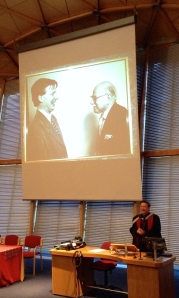
8 members of the Centre for Social Informatics tweeted the talk – including Frances Ryan, Christine Irving, Leo Appleton & Jan Auernhammer pictured here
It’s rare that all the members of the Centre for Social Informatics (CSI) manage to gather together at the same place at the same time. However, we almost managed it last Thursday when we attended the inaugural professorial lecture of our CSI colleague Dr Alistair Duff. Apart from one PhD student and one researcher (who was at a conference in Finland presenting two papers, including one that I co-authored), there was a full turn-out of the academic staff, researchers, and research students of CSI at the event, all eager to hear what Alistair had to say about The information society and its challenges. Two PhD students made special journeys to attend the event from afar: Leo Appleton caught the train up from Liverpool and Nicole Van Deursen flew in from Spain.
Alistair began his presentation by defining the term “information society” and referring to three particularly influential works: (1) Machlup’s The production and distribution of knowledge in the United States (1962); (2) Daniel Bell’s The coming of the post-industrial society (1973); and (3) Masuda’s The information society as post-industrial society (1984). In his early career Alistair was lucky enough to meet and correspond with Daniel Bell, and shared with the audience a photograph of their meeting.
Alistair then went on to outline what he believes are three big problems of the information society: poverty; privacy; and the press. He argued that we have a duty to take care of the poor, and this includes the information poor, who struggle to participate in the information society. He expressed his shock that privacy appears no longer to be regarded as a social norm, but has become a “quaint virtue” as we drift into a surveillance society. In the last part of his talk he demonstrated his enthusiasm for the “dead tree press” (as opposed to what he considers to be ephemeral comment in the transient blogosphere) as a means of disseminating informed opinion. In short he called for protection of the poor, privacy and the press.
Alistair took advantage of his public platform to thank his colleagues in the Centre for Social Informatics and the School of Arts and Creative Industries, and the bodies that have funded his research over the years, in particular the Carnegie Trust for the Universities of Scotland and the AHRC. He admitted to almost forgetting to thank his wife, even though she was sitting opposite him in the front row of the audience. Happily he remembered just in time (and – in his own words – thus managed “to avoid a beating” when he got home!)
After the formal proceedings in the auditorium were over we enjoyed a reception, where discussion of the themes covered in Alistair’s presentation continued over drinks.


